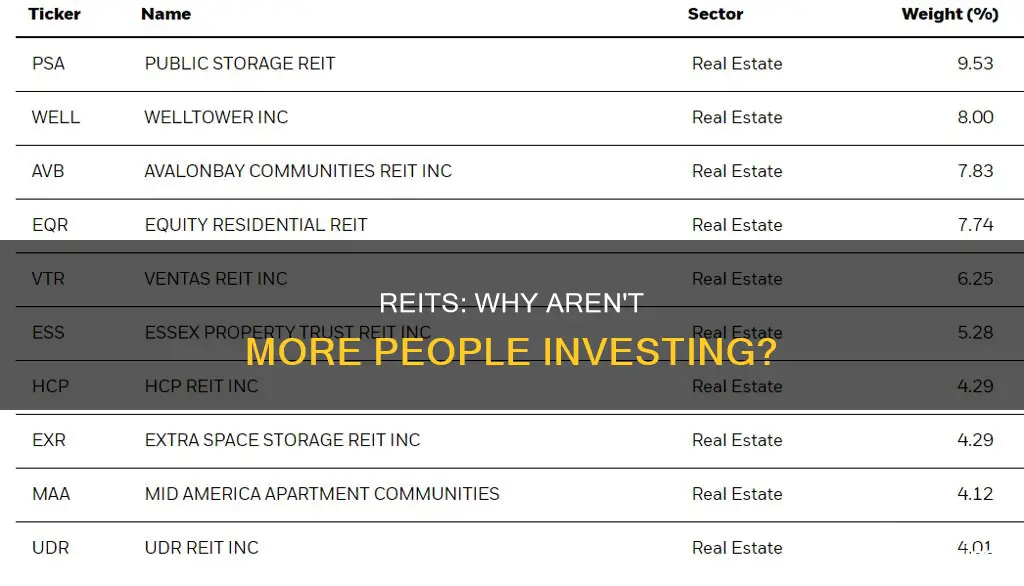
Real Estate Investment Trusts (REITs) are a special type of real estate company that owns, operates, and/or finances commercial real estate assets. They are an increasingly popular way for investors to access the real estate market, but there are several reasons why more people don't invest in them. Firstly, REITs are not risk-free and may have highly inconsistent and variable returns. They are also sensitive to interest rate changes, liable to income taxes, may not be liquid, and can be dramatically affected by fees. Additionally, REITs may not provide much diversification from an investor's stock portfolio, and the dividends are typically taxed at a higher rate than other investments. Finally, some REITs are riskier than others and may be influenced by specific property trends, such as the popularity of frozen yogurt shops in strip malls.
| Characteristics | Values |
|---|---|
| Returns | Inconsistent and variable |
| Interest rates | Sensitive to changes |
| Taxes | Taxed as ordinary income |
| Liquidity | Not always liquid |
| Time horizon | Long-term commitment |
| Growth potential | Low |
| Management | Requires the right management |
| Investor experience | Less ideal for experienced investors |
| Diversification | Correlated with the stock market |
| Fees | High fees |
What You'll Learn

High fees
Upfront fees for non-traded or private REITs can be as high as 11% or more of the investment. Private REITs may also charge a 2% annual management fee. Fees for non-traded REITs can include external manager fees, which reduce investor returns.
Management fees for investment managers overseeing a REIT can range from 0.05% for a low-cost index fund to 5% or more for top hedge funds. Management expense ratios (MERs) are a combination of management fees and other administrative overhead costs, which can hurt returns if they are unnecessarily high.
Acquisition fees for non-traded REITs typically range from 1% to 2% of the total deal size and cover the investment manager's deal-finding expenses. Asset management fees for these REITs usually range from 1% to 2% of the total equity invested and cover expenses related to investment management services. Administrative fees, which cover financial compliance expenses such as tax reporting and audits, are typically between 0.1% and 0.2% of total equity invested and are collected annually.
Performance-based fees, or incentive fees, ensure that the REIT's financial performance aligns with investors' interests. These typically consist of 20-30% of the fund's profits.
Forging Checks: A Risky Investment Gamble
You may want to see also

Lack of diversification
Real Estate Investment Trusts (REITs) are often touted as an effective way to diversify one's portfolio. While it is true that REITs can provide some diversification benefits, it is important to note that they may not offer as much diversification as some investors believe.
Firstly, it is important to understand that REITs are not perfectly uncorrelated with other asset classes, particularly stocks. In fact, REITs have been found to have a positive correlation with the stock market, meaning that their performance tends to move in the same direction as stocks. This correlation can vary over time, and there may be periods when REITs are highly correlated with stocks, reducing their diversification benefits.
Additionally, REITs themselves can be quite diverse, investing in different sectors of properties such as retail, shopping centres, hotels, healthcare facilities, and office buildings. As such, investors need to be mindful of the specific types of properties that a particular REIT is invested in, as this can impact its performance. For example, during times of economic downturn, hotel REITs often perform poorly, while healthcare or retail REITs may be more resilient.
Furthermore, while REITs can provide exposure to commercial real estate, they may not offer the same level of diversification as direct ownership of real estate. Direct investment in rental properties, for instance, can provide ongoing passive income, tax benefits, and true diversification from the stock market.
Another consideration is the size of the REIT sector within an investor's portfolio. While adding REITs can enhance diversification, overexposure to this sector may increase overall portfolio risk. As such, investors should carefully assess their allocation to REITs relative to other asset classes to ensure adequate diversification.
In conclusion, while REITs can provide some diversification benefits, they should not be relied upon as the sole source of diversification within an investment portfolio. Investors should carefully evaluate the specific properties held by a REIT, consider alternative real estate investments, and maintain a balanced allocation across various asset classes to ensure adequate diversification.
Madoff's Web of Deceit
You may want to see also

Interest rate sensitivity
REITs are sensitive to interest rate changes, particularly those that use variable-rate debt. When interest rates rise, REIT share prices can be prone to volatility. This is because, in most cases, REITs use a combination of debt and equity to purchase property. As a result, they are more sensitive to changes in interest rates than other asset classes.
However, it is important to note that the relationship between interest rates and REIT returns is complex and depends on various factors, including the market cycle and the specific industry in which the REIT operates.
Historically, REITs have performed well during periods of rising long-term interest rates. From the first quarter of 1992 to the fourth quarter of 2021, the average four-quarter return for REITs in periods with rising rates was 16.55%, compared to 10.68% in non-rising rate periods. REITs outperformed the S&P 500 in half of the periods when Treasury yields were rising during this time.
The positive association between rising rates and REIT returns can be attributed to strengthening macroeconomic conditions, which lead to higher occupancy rates, stronger rent growth, increased funds from operations, rising property values, and higher dividend payments to investors.
Additionally, REITs have taken steps to prepare for higher interest rates by strengthening their balance sheets and reducing exposures to interest rates. As of the fourth quarter of 2021, REITs had lowered their debt-to-book assets ratio, locked in low-interest rates for several years, and improved their interest coverage ratios.
In summary, while REITs are sensitive to interest rate changes, historical data suggests that they have performed well during periods of rising long-term interest rates. However, it is important to consider the specific market cycle, industry, and individual REIT when evaluating the potential impact of interest rate changes on REIT returns.
What Your Peers are Investing In
You may want to see also

Tax implications
REIT dividends can be taxed at different rates because they can be allocated to ordinary income, capital gains, and return of capital. The majority of REIT dividends are taxed as ordinary income up to a maximum rate of 37% (returning to 39.6% in 2026), plus a separate 3.8% surtax on investment income. This means that investors must pay taxes on the dividends each year, even if they reinvest them.
However, there are some tax benefits to investing in REITs. REITs themselves do not pay corporate income taxes because they pass on their earnings to investors as dividends. Additionally, REIT investors can deduct 20% of their dividends earned for the qualified business income deduction. This provision effectively lowers the federal tax rate on ordinary REIT dividends from 37% to 29.6% for a taxpayer in the highest bracket.
Another portion of REIT dividends may consist of capital gains, which are taxed at different rates depending on the length of time the REIT company owned the asset and the investor's income level. If the asset was held for less than a year, the shareholder's short-term capital gains liability is taxed at their marginal tax rate. If the REIT held the property for more than a year, long-term capital gains rates apply; investors in the 10% or 15% tax brackets pay no long-term capital gains taxes, while those in all but the highest income bracket will pay 15%. Shareholders in the highest income tax bracket will pay 20% for long-term capital gains.
Furthermore, a portion of the dividend may be listed as a non-taxable return of capital. This occurs when the REIT's cash distributions exceed earnings, such as when the company takes large depreciation expenses. This part of the dividend is not taxable when it is paid to the unitholder but is taxed later when the investor sells their units.
It is important to note that non-US residents investing in US REITs may be subject to a 30% withholding tax, although a reduced rate and exemption may apply if there is a tax treaty between the US and the investor's country of residence.
Doge Investors: Who and How Many?
You may want to see also

Illiquidity
Non-traded and private REITs are considered illiquid investments. These types of REITs are not publicly traded on stock exchanges, making it challenging for investors to buy or sell their shares. In some cases, investors in non-traded REITs may be unable to sell their shares for a predetermined period, which could be as long as seven to ten years. This lack of liquidity can pose a significant risk, particularly if investors need to access their funds in an emergency.
The illiquidity of non-traded and private REITs also makes it difficult to determine their value. The lack of a public market and transparent pricing information can make it challenging for investors to assess the worth of their investment accurately.
Additionally, non-traded and private REITs often have higher account minimums, steep fees, and may be restricted to accredited investors with a certain net worth or income level. These factors further contribute to the illiquid nature of these investments.
In contrast, publicly traded REITs are considered highly liquid. They can be easily bought and sold on major stock exchanges, providing investors with a more efficient way to invest in real estate.
Fear of Losing Money: Why People Don't Invest
You may want to see also
Frequently asked questions
REITs are sensitive to interest rate changes and can be dramatically affected by fees. They are also liable to income taxes and may not be liquid.
REITs are not risk-free. They may have highly inconsistent, variable returns, and can be dramatically affected by fees.
REITs offer investors the chance to achieve the benefits of real estate ownership without the hassle of finding, purchasing, and managing a property. They also provide diversification and the potential for dividends.
Alternatives to the REIT include mutual funds, ETFs (exchange-traded funds), and private equity syndications.







